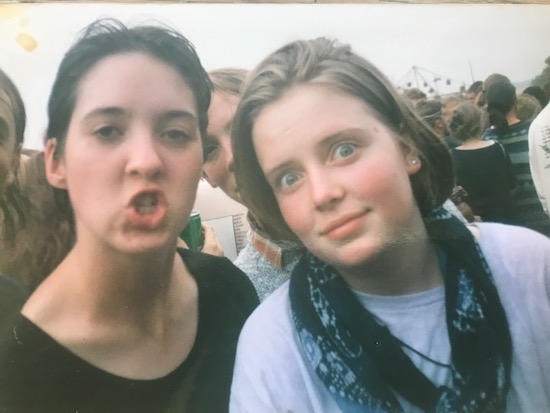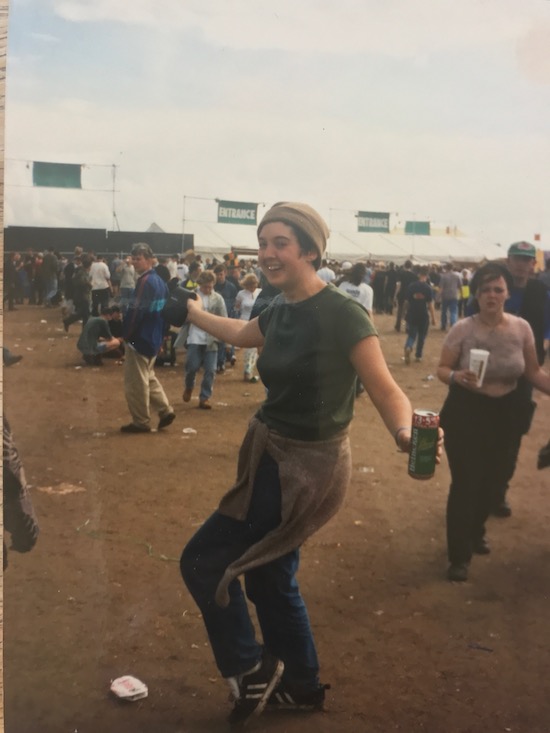"The main thing to remember, and the thing I kept trying to think of to stop myself from being too nervous, was the fact that it wasn’t really that people were there to watch you playing a concert. They were there to take part in the atmosphere…and as long as went as long with the atmosphere…they would like it." – Jarvis Cocker, Japanese TV interview after the Glastonbury Festival, 1995
When I think about my best live music experiences, I don’t always think of conventional things. I think of a caravan, white-lit like a Hopper painting against a sky of deep, witchy blue, pulling it towards me at 5am, selling egg rolls to knackered ravers drenched in sweat. I think of rain beading down my face, my hair slick to hot cheeks, my eyes pinned to Joanna Newsom’s hands dizzying the strings of her harp, as Crickhowell’s Table Mountain loomed behind her at dusk.

This weekend marks the twenty-fifth anniversary of my first proper gig, which by accident of the lacklustre live scene at the time in my hometown of Swansea, was a ton of gigs strung together over a sun-struck weekend: the 1995 Glastonbury Festival. This weekend, when the 2020 festival was supposed to have taken place, I’ll be remembering it by watching the Glastonbury Channel on the BBC iPlayer. From the vantage point of my quietest, most surreal summer, this feels exceptionally bittersweet.
To put things in context, Glastonbury 1995 zapped me awake: before it, I was an anxious, swotty teenager who spent most of her life making mixtapes in her bedroom. The story that surrounds it also wraps me up in the comfort blankets of memory. My best friend Danny’s mum, Big Jude, took a gang of us down, in a rented minivan, just after our summer exams. Big Jude was a much-loved local nurse who was recovering from cancer, and had always want to go. This meant we had a reliable mam in our ranks, but one who also let us run wild. She died in 2002. We still miss her so much.
From our camp up by Worthy Farm overlooking the Pyramid Stage, we roamed free. The sun shone all weekend. I took a disposable camera with me (all the rage, then) but took hardly any pictures. We also had no mobile phones either, this being 1995: we met at 4pm in front of the bins, or to the left of the tempura stall, clutching cans of cheap lager. There was nothing to distract us but us.
We watched Justine Frischmann, a living, breathing, spidery god, thrashing her guitar as the day turned to night on the NME stage. We felt Gaz Coombes’ sweat falling off his sideburns onto us in the moshpit, and felt weirdly anointed. We thought we’d died when PJ Harvey strutted onto the stage in a shocking-pink catsuit, then hollered Meet Za Monsta like her soul was coming out of her mouth.

I have many other highs at other festivals, of course, like watching Kraftwerk, Orbital and Daft Punk back-to-back at Tribal Gathering 1997 (followed by the most euphoric post-show egg roll of my life), or watching Joanna Newsom at the 2010 Green Man in biblical rain, an experience so magical I eventually moved to a house with a view of the Brecon Beacons National Park.
But my love of live music has waxed and waned ever since that first perfect weekend, something a music critic probably shouldn’t articulate out loud, but there it is. Part of it is a professional thing. If I’m reviewing an artist I adore, I know I’m always conscious of creating a narrative of that night, rather allowing myself the chance to disappear into the experience. I much preferred seeing Kate Bush with my best friends, as a punter, three weeks into her Hammersmith residency, after a feverish morning refreshing a ticketing site on an old laptop, for example, than I did as a critic in a row of other critics on the first night.
But there are other reasons. I get anxious, on and off, in busy spaces, like many people do. I sometimes can’t lose myself in the moment because of self-consciousness. As people have danced less and less at gigs over the years, I’ve caught myself furling myself in. I’ve also noticed this lack of abandon has become more common in a world where it’s normal to be constantly connecting and disconnecting. It feel like we’ve been programmed to operate this way, in our era of online interaction: to consider ourselves as entities apart from ourselves, to always keep controlling our narrative, and not just let go. At bigger concerts, it’s normal to see people not connecting with the performers at all. They’re there to film, and to tweet, and to say they were present, to wear proximity to an artist like a strange status symbol to be virtually, but not physically, shared.
But that was before Covid-19. Since March, live gigs have changed beyond all comprehension. I’ve enjoyed many, watching Alasdair Roberts playing Café Oto alone while drinking wine in my slippers, watching Steven Adams perform on Zoom from his living room. But they’ve also made me realise a gig is about much more than an artist. At Roberts’ gig, some old friends popped up to say hello on the YouTube chat board, who I hadn’t spoken to for ages. At Adams’ show, you could see other ‘gig-goers’ if you scrolled through Zoom’s gallery view: I found Scottish Jude, Andrew and Heather, good friends I hadn’t expected to be there. But reading their words, or seeing them sat in their living rooms, wasn’t enough. I wanted to beam myself into the screen, run to the bar, buy them a drink, and hold them close as we sang along.
For this is what live music really is at its best: a glowing, thrilling realm of communal feeling. It’s fed by a collective will, the hope that everyone surrounding you – including the artists – will become part of it, too. It’s about being bonded palpably, intensely, with other bodies in a field or a room, for a consensus to be formed out of that boozily random chaos. Some of these bodies you’ll know well: they’ll throw an arm around you in a chorus, even if they haven’t hugged you for ages, pull you in, and you’ll become one. Other bodies will belong to strangers, but they’ll be tantalising ones. Their neurons are being fired in the same way by a rhythm, or a bridge, or a chord change. Their tongues are wrapping themselves around words that you thought were just yours.
This coming Glastonbury weekend, I’ll be thinking of how inordinately lucky I was to have had that experience as my first live experience. I’ll be thinking of the teenagers who’ve already lost out on not seeing their friends in this hot, surreal summer, missing out on the pivotal experience of going away to a festival – any festival – for three days to disappear.
I’ll also be thinking of myself watching Glastonbury on TV last June, and how it was the first time I’d wanted to be at the festival properly in years (I’d been to seven Glastonburies in total, six of them marred by terrible weather, muddy injuries, bad work experiences, and an ill-advised trip to the Tiny Tea Tent). What broke me was wanting to be there to feel the heat and the energy of Stormzy’s combination of politics and warmth, to feel the Sunday afternoon snuggle of Kylie Minogue’s brand of British-Australian nostalgia. Kylie also talked movingly about not headlining Glastonbury in 2005 because of her cancer diagnosis, and with that, I was gone. It made me think of Big Jude, and her desire to get out and experience a festival, and let us experience our own. It made me think about how the realm of communal feeling travels between life and death and back again.
This summer, it’s very hard to think about when we’ll next be able to bond with others in a room or a field, especially for the people whose lives depend on working within it. The government has so far failed to respond to industry pleas for help in a crisis that has hit it brutally hard. The particular cruelty of Covid-19 is that it’s turned our desire to be together into a source of disquiet and danger. Personally, the desire has become a source of deep longing: every time I look at the mountains out of my window, and think of the Green Man on the other side of them, my spirit sinks a little.
Nevertheless, I have to tell myself that there is something positive lurking in all this. This loss has made me reassess why I was isolating myself from the world before the pandemic struck. It’s made me realise how bonding with others in person – both friends and strangers – is something we should never ever again take for granted. It’s made me realise that connecting and disconnecting from the world is a powerful modern malaise which needs to be conquered.
One day, hope against hope, things will be different. This may be a day far into the future. We may have to reconstruct our communal realm of feeling out of the rubble of an unsupported, devastated industry, too. But there are too many of us who care about that realm to let it go, to let it die, for it to be lost for ever. We’re all still together, whoever we are, after all, carrying the Hopper glow of the caravan, the looming mountain, the teenage girl being overwhelmed by an atmosphere, within us.


